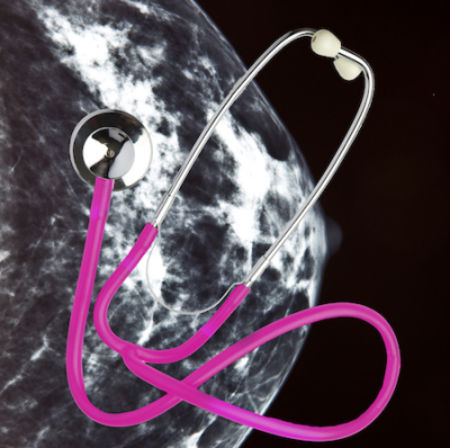Patients with advanced breast cancer benefit more through undergoing continuous chemotherapy which helps them both improve survival outcomes and maintain quality of life, as opposed to intermittent scheduling, according to new results of the Stop&Go study which will be presented at the ESMO Breast Cancer Congress 2-4 May, in Berlin, Germany.
This phase III study examined 420 patients, randomised with advanced HER2-negative breast cancer to either an intermittent schedule (four cycles - ‘treatment holiday’ - another four cycles) or a continuous schedule composed of eight same cycles administered consecutively. The first line treatment (paclitaxel plus bevacizumab) and second line treatment (capecitabine or non-pegylated liposomal doxorubicin) followed these schedules. The study analyses reports on the secondary endpoints from the Stop&Go study, with the main endpoint for second-line being progression-free survival (PFS).
You may also like: Mammography damage control: a decade of fake news
Dr Frans Erdkamp from Zuyderland Medical Center - Sittard-Geleen, Netherlands, presented findings related to the survival benefits of continuous scheduling in both first- and second-line chemotherapy compared to intermittent therapy. “Our main focus in this analysis was on the efficacy of second-line treatment, although, interestingly, the updated overall survival results showed that for the whole population (those who received first line only, or first and second lines of treatment) the survival was better with continuous treatment as well,” said Erdkamp.


Unknown-1-1
Patients who started second line treatment (n=270; 131 vs. 139 in intermittent vs. continuous arms) demonstrated a median PFS in second line of 3.5 vs. 5.0 months respectively, with a hazard ratio (HR) of 1.04 (95%CI 0.69-1.57). The median combined first- and second-line PFS for this population was 14.6 vs. 16.6 months with a HR of 1.59 (95%CI 1.04 – 2.45).
The quality of life results were presented by Dr Anouk Claessens, part of the research team from Zuyderland Medical Center - Sittard-Geleen, Netherlands. “In clinical practice, we see considerable variation in treatment strategies, so I felt it would be helpful to conduct a trial investigating the effect on quality of life of scheduling with modern agents.” Claessens hypothesised that treatment holidays incorporated into scheduling would benefit quality of life.
Quality of life was measured every 12 weeks during treatment and follow-up, using RAND-36 questionnaires specifically chosen for their relevance to normal life. The course of both the physical and mental quality of life scores for each sequencing arm were monitored and the difference in course was estimated between arms. Median follow-up was 11.3 months.
“With the physical quality of life scores, we saw a linear decline in the intermittent arm causing a clinically meaningful difference of 5.68 points at 24 months (p <0.001), while scores in the continuous arm stabilised after a decline of ±3.5 points at 12 months,” reported Claessens.
“Comparison of the course of quality of life between the treatment arms (showed the maximum differences were not statistically significant but there was a trend for more favourable scores in the continuous arm,” added the researcher.
“Based on our findings, you could hypothesise that the benefits of a continuous approach might be independent of the investigated treatment line and might apply to other lines of treatment as well,” said Claessens. “The challenge for clinical practice is to use agents that are well tolerated and can be continued for a prolonged period without interruptions,” she added.
Co-investigator, Dr Monique Bos, from Erasmus University Medical Center, Rotterdam, Netherlands, remarked: “We were a little surprised at the findings running contrary to our hypothesis. In explaining therapy schedules to patients we tend to suggest that a ‘holiday’, by nature of the word, might be beneficial, but this was not the case.
Commenting on the results, Professor Nadia Harbeck from the University of Munich (LMU), Germany, said: “Both studies confirm the current national and international guidelines that chemotherapy, preferentially monotherapy – at least after first line, should be given continuously, as long as it is well tolerated and effective. Until now, we’ve only had evidence from older studies, with regimens no longer used, indicating that continuous chemotherapy in metastatic disease is better than shorter. The new Stop&Go data confirm these older data also with more modern regimens.”
“The result that continuous chemotherapy is not at all associated with worse quality of life is clinically meaningful,” said Harbeck. “and further highlights the importance of preferring to administer chemotherapy continuously for benefitting the most our patients with advanced disease”.
Source: ESMO
References:
1 Abstract 158P_PR ‘Intermittent versus continuous chemotherapy beyond first-line for patients with HER2-negative advanced breast cancer (BOOG 2010-02)’ will be presented by Anouk Claessens during the Poster Display session on Friday 3 May, 12:15 to 13:00 (CEST) in the Exhibition area. Annals of Oncology, Volume 30, 2019 Supplement 3, doi:10.1093/annonc/mdz095
2 Abstract 159P_PR ‘Influence on quality of life of chemotherapy scheduling for patients with advanced HER2-negative breast cancer' will be presented by Anouk Claessens during the Poster Display session on Friday 3 May, 12:15 to 13:00 (CEST) in the Exhibition area. Annals of Oncology, Volume 30, 2019 Supplement 3, doi:10.1093/annonc/mdz095
Latest Articles
breast cancer, patient care, quality of life, chemotheraphy, bevacizumab, monotherapy, ESMO 2019 Congress, ESMO 2019, ESMO Breast Cancer Congress 2019, advanced breast cancer, Stop&Go study, survival outcomes, HER2-negative breast cancer, PFS, progression-free survival, paclitaxel, capecitabine, non-pegylated liposomal doxorubicin, RAND-36, #ESMOBreast19, Frans Erdkamp, Zuyderland Medical Center, Dr Anouk Claessens, Monique Bos, Erasmus University Medical Center, Rotterdam, Nadia Harbeck, University of Munich (LMU)
Patients with advanced breast cancer benefit more through undergoing continuous chemotherapy which helps them both improve survival outcomes and maintain quality of life, as opposed to intermittent scheduling, according to new results of the Stop&Go study



























